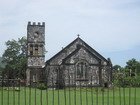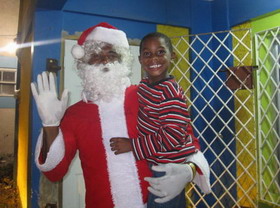Jamaican Traditions
Birth and Death Practices
When I thought about the Jamaican traditions I'd like to share with you, I realised that many of them have to do with birth and death.
Many of these Jamaican customs are widespread. But some are carried out only in some parts of the island, and some are far removed from the upper echelons of society.
Many of them are rooted in our African ancestry, and the background and logic to them may not be clear to us in modern times. Some of them are slowly dying, but deserve to be remembered.
Jamaican Traditions and Beliefs - Pregnancy and Birth
The navel string (umbilical cord) of a newborn may be buried and a tree planted on the spot. This tree is called the birth tree or navel string tree. It is usually a source of great pride to children as they are growing up. It also indicates an unbreakable connection with the land on which the tree is planted.
An open Bible is often placed in a newborn's crib or bed, to protect the baby and ward off evil. The Bible is usually left open at a Psalm.
A red string may be tied around a newborn's wrist, or in the hair. This is to 'run duppy' (chase ghosts away) and ward off evil.
Many parents will not cut an infant's hair before the child has started to speak. It is believed that cutting the hair will delay the start of speech.
The fingernails of an infant should not be cut with scissors as this might make the child grow up to be a thief. A pin may be used, as the fingernails at that stage are very soft.
New mothers are encouraged to stay indoors for a few days so as not to catch a 'baby cold'. It used to be customary for both mother and newborn to be isolated for eight days after birth.
An expectant mother is believed to 'mark' her child with the things she craves during pregnancy. So if the mother craves mangoes, the baby is likely to be born with a birthmark resembling a mango.
A pumpkin vine will bear abundantly if a pregnant woman steps over it.
If a lizard jumps on a woman, it means she is pregnant or will soon become pregnant.
Jamaican Traditions and Beliefs - Death
When someone dies, there are rituals which are sometimes performed in the person's home. The furniture in the deceased's room is rearranged and the mattress turned over. This is to ensure that the person's spirit (duppy) will not recognise the room, and therefore won't want to stay there.
If a person dies at home, someone may sweep behind the body as it is being carried out of the house, so that the spirit will leave along with the body.
When a husband dies, the widow will often sleep in red underwear, or tie a red string or tape measure around her waist. These are believed to ward off the dead man's duppy, which may want to trouble the widow (in a husbandly way) in her sleep.
Before a grave is dug, it is necessary for the diggers to have white rum on hand to pour a libation to the earth spirits before ground is broken.
Children are told never to point at graves, as this will cause your fingers to fall off, or other bad things to happen. If you forget, your only hope is to bite each finger really hard. (I'm grateful my fingers didn't scar easily.)
One of the strongest Jamaican traditions concerning death, is that of a wake, also called Nine Night or Set Up. It was believed by African slaves that a person's spirit took nine days to travel home to Africa, and this is probably where the tradition started.
Family and friends gather at the dead person's home to comfort the bereaved, and to give the spirit a good send off from this world. This may be done on one or many nights, with the ninth night or the night immediately preceding the funeral being of the most importance. It was an African belief that the person's duppy would live on and become a nuisance to the survivors if not treated with respect before burial.
Although the concept is African derived, the proceedings at a wake have a strong European Christian influence. Special hymns (sankeys) are sung emphasising the soul's journey to heaven. The singing is done in a style known as 'tracking', where someone will call out one line of the sankey at a time, and then the rest of the gathering will sing the line together.
The activities at a wake will vary according to place, class, and religious beliefs. Food and drink, including white rum, are a must at all wakes. The refreshments are usually provided by the family, often with the financial assistance of friends and well wishers. Nowadays in rural areas, it is not unusual for a sound system to be hired for the occasion. Food vendors may set up stalls on the roadside if it is expected that the Set Up is going to be a large one.
Click here to learn about Jamaican traditions at Christmas and Easter.
If you'd like some insight into the practice of Obeah in Jamaica, click here.
Return from Jamaican Traditions to Real Jamaica Vacations









